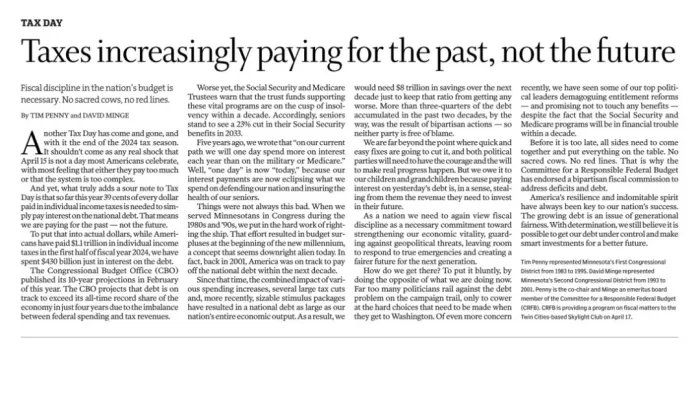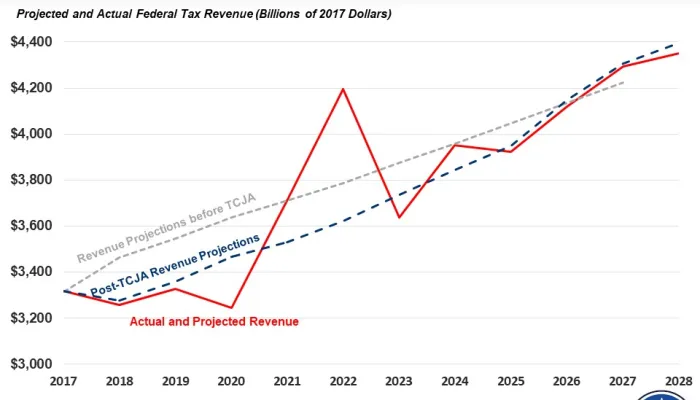Maya MacGuineas: 31 Years Later, Tax System Stuck in the 'Danger Zone'
Maya MacGuineas is president of the nonpartisan Committee for a Responsible Federal Budget and head of the Campaign to Fix the Debt. She recently wrote an opinion piece for The Hill newspaper. It is reposted here.
The last time America reformed its tax system, "Top Gun" was still in theaters. With the way the world has evolved since then — from computers and smartphones to online commerce — it is almost beyond belief that we still pay our taxes based on a 31-year-old code.
However, that could soon change. A “once-in-a-generation” chance to modernize the tax code is underway, with congressional leaders and President Trump vowing completion of the work by year’s end. Tax reform is desperately needed, and well-designed reform can do much to unlock faster economic growth.
The 1986 model is the right one. Experts and politicians from both parties came together to design a reform that lowered tax rates, broadened the tax base and modernized the income tax. Key to the 1986 reform was the principle of budget neutrality (at the time the debt’s size was 38 percent of the economy, today it is 77 percent) — and this principle must at the very least be carried into today’s debate. Budget neutral tax reform is generally more pro-growth than debt-busting tax cuts, which are simply unaffordable given today’s record-high debt levels.
Those of us who have pushed for tax reform for years were somewhat encouraged last week when the “big six” — House Speaker Paul Ryan (R-Wis.), House Ways and Means Chairman Kevin Brady (R-Texas), Senate Majority Leader Mitch McConnell (R-Ky.), Senate Finance Chairman Orrin Hatch (R-Utah), Treasury Secretary Steve Mnuchin and White House National Economic Council Chairman Gary Cohen — unveiled some principles to begin the tax reform debate in earnest.
Yet, missing from these principles was the important discussion of budget neutrality. Actually, the principles make neutrality harder by ruling out the controversial “border adjustment” provisions that would have otherwise raised more than $100 billion per year. (One should always be wary of principles that focus on how they won’t pay for something instead of how they will.) Luckily, many options still exist to ensure tax reform is fiscally responsible.
Policymakers should start by repealing most individual and business tax preferences, which distort business decisions, complicate the tax code, primarily benefit the wealthy and cost almost $1.6 trillion a year.
The most popular breaks — for mortgages, charity, retirement savings and health care — could be retained but scaled back and reformed. Either policymakers could reform each provision individually, as in the Simpson-Bowles commission plan, or they could consider an across-the-board limit like the one I proposed with Martin Feldstein and Daniel Feenberg.
If tax reform really does include “unprecedented expensing” like the “big six” principles suggest, it should be accompanied with limits on interest deductibility to prevent overly subsidizing debt; and they should gradually phase-in business rate reduction to minimize transition costs and maximize the economic benefit of expensing.
Policymakers should also consider other reforms, like reducing some non-tax-expenditure base provisions or identifying new sources of revenue outside of the income tax.
Only after these changes are identified should individual and corporate rates be set. We should lower rates as much as we can without adding to the debt, but we should arrive at that number based on the math, not simply hitting "lucky 15" on a dart board. Without a new source of revenue (and I still think the idea of a carbon tax is a good one), realistically, we can probably get the corporate rate to an internationally-competitive 25 percent or a bit lower — not to an arbitrary and unaffordable 15 percent.
Lower rates are only more pro-growth if they are paid for. Otherwise, the extra investment they encourage will be countered by the “crowding out” caused by higher debt. As Brady recently said, “Tax reform has to move us toward a balanced budget, not away from it.”
"My Views" are works published by members of the Committee for a Responsible Federal Budget, but they do not necessarily reflect the views of all members of the Committee.


